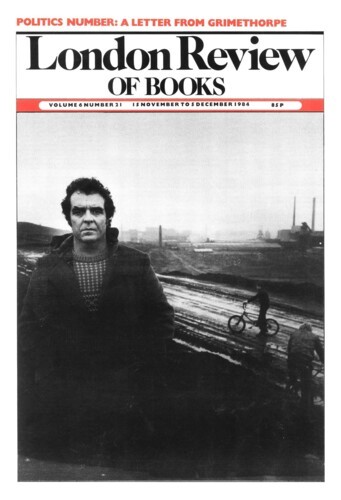Geoffrey Hawthorn
Geoffrey Hawthorn is the author of Thucydides on Politics, among other books.
Sociology in Cambridge
Geoffrey Hawthorn, 6 November 1986
Cambridge has re-appointed to its chair of sociology. The chair is still not established, and will have to be argued for again when it’s vacated. The argument for filling it at least once more was conservative: there has been a professor since 1970, there was a department of social and political sciences and a degree which included the subject, and these had to have a head. The consequence of filling it is conservative too. It is a determination to try to establish sociology by separating it still further from the subjects that are close to it. But this curricular victory will be intellectually empty. Sociologists have certainly abandoned the pretension to a scientific ethic which long made them so suspicious to others. Having done so, it is not clear that, left to themselves, they have left themselves much to say.
What’s wrong with the SDP?
Geoffrey Hawthorn, 21 November 1985
Those who voted for the Alliance at the last election tended to be as hostile as Tories to nationalisation. They were nearly as fierce about the Unions too. But they were well disposed to redistribution, as keen on creating jobs as those who’d voted Labour, and on several of the ‘moral’ issues markedly more liberal. Who are they? Tories had the vote of two-thirds of the managers in private concerns; Labour of two-thirds of the workers in public ones; the Alliance, of nearly half of all graduates. They are, in Julian Critchley’s description, ‘the examination-passing classes’. Decent people.
Hegel’s Odyssey
Geoffrey Hawthorn, 3 October 1985
Ottilie von Goethe recalled a lunch in Weimar in October 1827. Her father-in-law, as usual, had not bothered with the introductions.
Initiatives
Geoffrey Hawthorn, 15 November 1984
As yet, the Social Democrats have no historian. There have been a few breathless attempts to recall the more obvious events. Roy Jenkins’s memorable (and memorably pronounced) announcement in his Dimbleby Lecture of a runway ready for a take-off, the page of signatures in the Guardian, the Lime-house Declaration, and the constitutional convention in Kensington. There have been pieces – not least in this paper – which sketch the start of a political explanation – invoking the Parliamentary Labour Party’s inability to control the unions after 1960, the failure of the Campaign for Democratic Socialism in the 1970s, and the successes of the very differently-inclined Campaign for Labour Party Democracy, and the outcome of these and other changes in the new electoral college in 1981. There is the frequently flaunted economic fact that there is no future in Anthony Crosland’s sort of socialism because there is no firm future for the growth which – although less unequivocally than subsequent commentators have assumed – Crosland supposed adequate public spending to require. There have even been a few sociological reflections: Gareth Stedman Jones’s, for instance, which fix on the reforming middle class’s long and slow but now perhaps terminal loss of faith in the working class in whose name the reforms were to be made. But there has been, as yet, no connected account.’
Pieces about Geoffrey Hawthorn in the LRB
Be Spartans! Thucydides
James Romm, 21 January 2016
Thucydides may well have been the first Western author to address himself to posterity. His forerunners – Homer and Herodotus, principally – show no awareness of a readership...
The View from Here and Now: A Tribute to Bernard Williams
Thomas Nagel, 11 May 2006
One can believe in moral progress without accusing past ages of wickedness or stupidity (though there is plenty of both in all ages). Perhaps progress can occur only through a series of historical stages,...
Had Lenin’s train collided with the Berlin-Basle express
Charles Maier, 13 February 1992
Certainly not the saddest for historians, according to Geoffrey Hawthorn’s wonderfully playful and intelligent book: rather, the most instructive. Hawthorn is intrigued by the philosophical...
What’s wrong with poverty
John Broome, 19 May 1988
Welfare economics is concerned with what economic arrangements we should have, and what governments should do in economic matters. It is about right and good in economics. So it is a branch of...
Read anywhere with the London Review of Books app, available now from the App Store for Apple devices, Google Play for Android devices and Amazon for your Kindle Fire.
Sign up to our newsletter
For highlights from the latest issue, our archive and the blog, as well as news, events and exclusive promotions.




